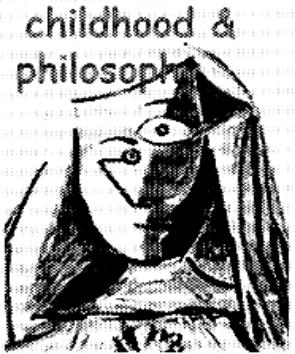developing new methods to assess community transformation through philosophical dialogue
DOI:
https://doi.org/10.12957/childphilo.2025.89457Palavras-chave:
comunidade de investigação filosófica, eficácia educacional, metodologia de avaliação, avaliação em grupo, autoavaliação, dinâmica de grupoResumo
Este estudo apresenta uma abordagem metodológica para avaliar o impacto educacional dos diálogos filosóficos. Com base no modelo Q-U, esta pesquisa desenvolve um quadro destinado a avaliar a dinâmica de grupo. O quadro foi implementado em diálogos filosóficos realizados em uma escola de Ensino Fundamental na Província de Gifu, Japão, a fim de examinar sua aplicabilidade prática. Os métodos de avaliação existentes enfatizam predominantemente a avaliação individual. No entanto, os diálogos filosóficos ocorrem em uma comunidade, onde transformações coletivas acontecem. O quadro proposto avalia tanto as transformações individuais quanto as comunitárias por meio de um questionário estruturado de autoavaliação, medindo o pensamento crítico e cuidadoso dos participantes. Os resultados indicam que os diálogos filosóficos contribuem para a maturação dos grupos de diálogo, como evidenciado pelas mudanças nas habilidades de pensamento crítico e cuidadoso dos alunos ao longo do tempo. Os resultados do estudo exploratório sugerem que os diálogos filosóficos podem promover melhorias graduais nas capacidades cognitivas e sociais dos participantes. A viabilidade de avaliar a transformação comunitária por meio de autoavaliações dos alunos foi examinada e considerada aplicável. Esses achados indicam que este estudo contribui para o debate contínuo sobre a avaliação dos diálogos filosóficos, ao defender metodologias de avaliação que captem sua natureza dinâmica e interativa. Pesquisas futuras devem incorporar avaliações de professores e colegas para complementar os dados autorrelatados. Além disso, a ampliação do tamanho da amostra e a introdução de grupos de controle aumentariam a validade do quadro proposto.
Downloads
Referências
Ab Wahab, M. K., Zulkifli, H., & Abdul, R. K. (2022, October 31). Impact of Philosophy for Children and Its Challenges: A Systematic Review. Children, 9(11), 1671. https://doi.org/10.3390/children9111671
Bakhtin, M. (1984). Problems of Dostoevsky’s Poetics. University of Minnesota Press.
Cleghorn, P. (1988). Thinking Through Philosophy (Vol. 1). Educational Printing Services.
Delbari, S., Shamir, A., & Naeini, M. (2020, March). Philosophy of Education for Elementary Children Considering the Role of Social Intelligence. Iranian Journal of Educational Sociology, 3, 189–202. doi: 10.52547/ijes.3.1.189.
Fair, F., Haas, L. E., Gardosik, C., Johnson, D. D., Price, D. P., & Leipnik, O. (2015). Socrates in the schools from Scotland to Texas: Replicating a study on the effects of a Philosophy for Children program. Journal of Philosophy in Schools, 2(1), 18–37.
Gregory, M. (Ed.). (2008). Philosophy for Children: Practitioner Handbook. Montclair State University.
Kawamura, S. (2007). Introduction to Q-U for Classroom Development: A Guide to Using the Enjoyable School Life Questionnaire. Toshobunka (in Japanese).
Lewin, K. (1951). Field Theory in Social Science. Harper & Row Publishers.
Lipman, M. (2003). Thinking in Education. Cambridge University Press.
Lipman, M., Sharp, A. M., & Oscanyan, F. S. (1980). Philosophy in the Classroom. Temple University Press.
Trickey, S., & Topping, K. J. (2006). Collaborative Philosophical Enquiry for School Children: Socio-Emotional Effects at 11 to 12 Years. School Psychology International, 27(5), 599–614.
Trickey, S., & Topping, K. J. (2013). Assessing the Outcomes of Philosophical Thinking with Children. In S. Goering, N. J. Shudak, & T. E. Wartenberg (Eds.), Philosophy in Schools: An Introduction for Philosophers and Teachers (pp. 288–298). Routledge.
Tsukahara, K., & Eguchi, T. (2019). Toward the Construction of Assessment Theory in “Philosophy for/with Children”: Opening the Possibility of Assessment or Evaluation Theory. Annual report of learning technology laboratory Teikyo University, 16, 69–76.
Wartenberg, T. (2014). Assessing an Elementary School Philosophy Program. Thinking: The Journal of Philosophy for Children, 20(3-4), 90–94.



